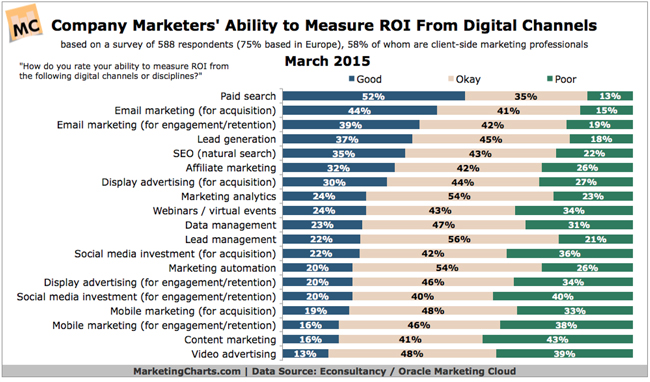
Many marketers believe their companies do a poor job measuring their content marketing efforts. Chart courtesy of copyblogger
Even as digital marketing becomes more sophisticated, content marketers still struggle with measuring the effectiveness of their efforts. As digital marketing evolves, measurement strategies and the most popular metrics continue to evolve. Marketers first favored impressions. Then they focused on clickthoughs. Measurements of business impact are now in vogue. Marketers continue to debate: What are the best metrics for measuring the effectiveness of content marketing?
And marketers aren’t at all sure they are doing a good job of measuring. According to a new survey from Econsultancy and Oracle Marketing Cloud, 43 percent of marketing managers rated their companies as “poor” at measuring content marketing, 41 percent said they are “okay” and 16 percent said they are “good.” Content marketing was the only one of 19 channels where more marketers rated their measurement poor than “okay” or good. Despite measurement challenges, 73 percent said they plan to increase spending on content marketing this year.
Marketers often assert that measuring ROI on content marketing is difficult.
“Let’s just be clear right now — that’s poppycock!” declares Michael King, digital marketing consultant at iPullRank, in a post of copyblogger. Results on digital marketing can be tracked and measured. That’s why it’s different from traditional marketing.
Categories of Marketing Metrics
King cites two categories of marketing metrics. Business metrics that directly impact company performance include:
∙ number of leads,
∙ amount of revenue generated,
∙ customer lifetime value,
∙ cost per acquisition and
∙ churn rate.
Channel metrics, which impact those business metrics, include:
∙ conversion rates per channel,
∙ persons visiting per channel,
∙ scroll depth of content per channel,
∙ traffic per channel.
Many commonly used metrics – such as traffic, search rankings, social shares, impressions and page views — are poor measures of content marketing effectiveness when considered alone. But it’s pretty likely marketers can improve business metrics – their ultimate goal – by gaining improvements in channel metrics.
Different Opinions about Marketing Metrics
Marketers at the Social Media Marketing World conference offered their opinions and recommendations, notes the TopRank Online Marketing blog.
Dan Gingiss, head of digital customer experience and social media at Discover Financial Services, recommends identifying the customer’s stage in the marketing funnel when considering metrics. In the awareness stage, impressions are an acceptable gauge. Engagement, such as likes or favorites, grows in importance in the consideration stage. While conversion is the ultimate goal, building long-term loyalty and maintaining service are also important.
Susan Beebe, manger, social media & online communities, Tyson Foods, advises comparing your brand to competitors and using links with trackable tags to track the progression of a sale.
What metrics you choose depends largely on who else will see your reports. Executives want to understand the big picture and evidence that a particular marketing campaign has contributed to the bottom line, if there has been improvement over time, and how the company stands in the marketplace. Managers want to know detailed facts about the target audience, what tactics improved response time, or what content helped the most.
Bottom Line: Digital marketers, particularly content marketers, continue to struggle to measure the effectiveness of their efforts. Numerous metrics can be used to measure digital marketing success. From those many metrics, each organization must choose the ones that best tell the story about the successes and limitations of their marketing initiatives. Those customized reports must meet the information needs of the different management levels using different metrics and tailored reports.
William J. Comcowich founded and served as CEO of CyberAlert LLC, the predecessor of Glean.info. He is currently serving as Interim CEO and member of the Board of Directors. Glean.info provides customized media monitoring, media measurement and analytics solutions across all types of traditional and social media.




